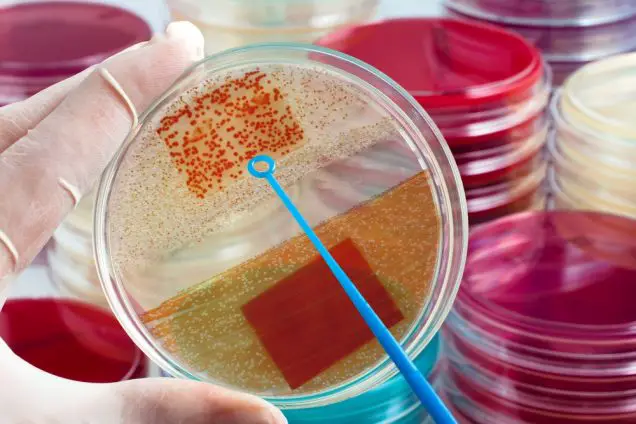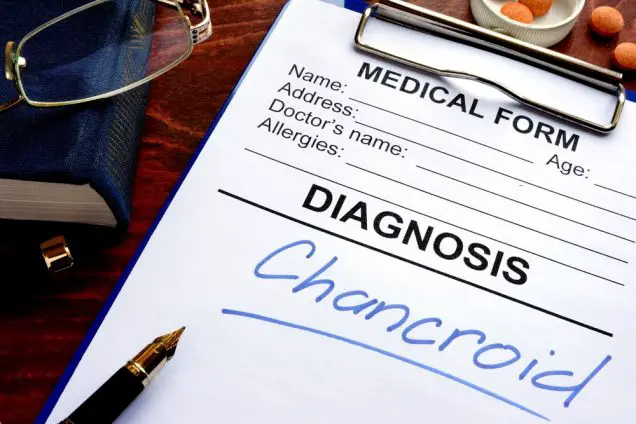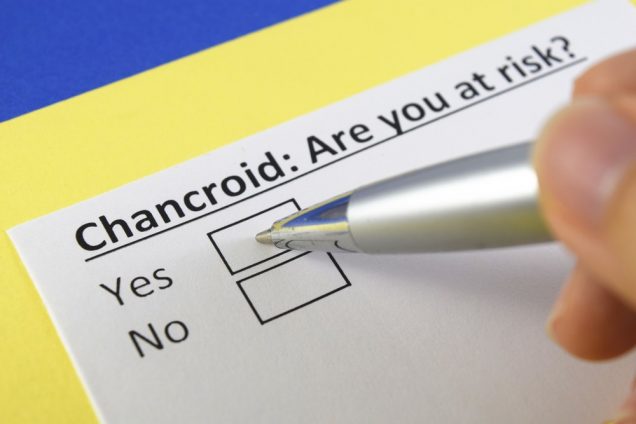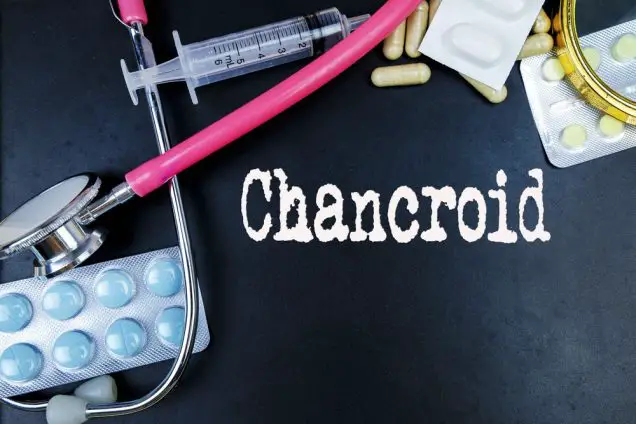Chancroid
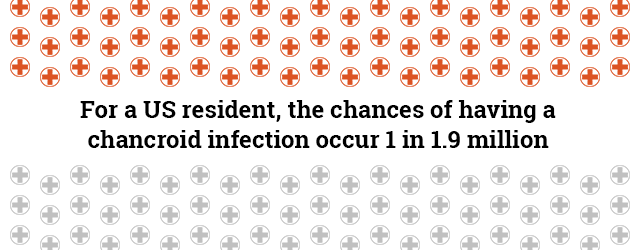
Contents
What is Chancroid?
Chancroid is a bacterial infection that results in sores on the mouth, throat, lips, anus, tongue, vagina or penis.
Chancroid belongs to the family of bacterial infections resulting in open sores in the area located around men’s and women’s genitals. This infection represents the type of venereal diseases obtained via sexual contact with a partner.
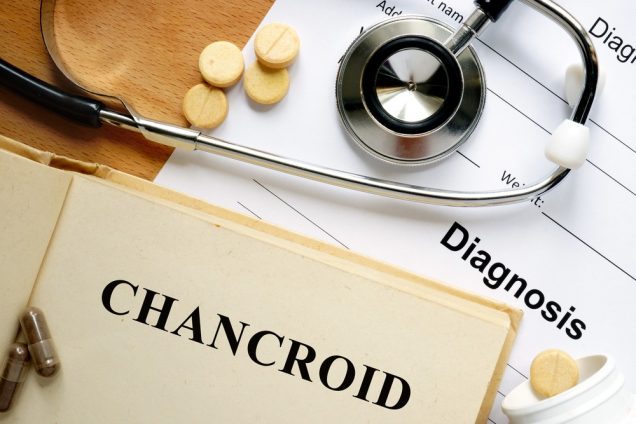
Though it is not very common in the United States, the infection is spreading rapidly in developing countries.
Chancroid is caused by a special type of bacteria which is called Haemophilus ducreyi. It acts in a harmful way attacking different tissues while producing an open sore in the area of men’s and women’s external reproductive organs.
Another feature of this infection is the fact that the sores may start bleeding or producing contagious fluid when it comes to oral, anal or vaginal intercourse. It should also be kept in mind that this disease can also be transmitted from skin to skin. Close contact with infected person is another way of catching Chancroid.
The infection is mostly met among sexually active patients. At the same time those who live in countries with poor healthcare systems and sanitation conditions are also prone to obtaining Chancroid.
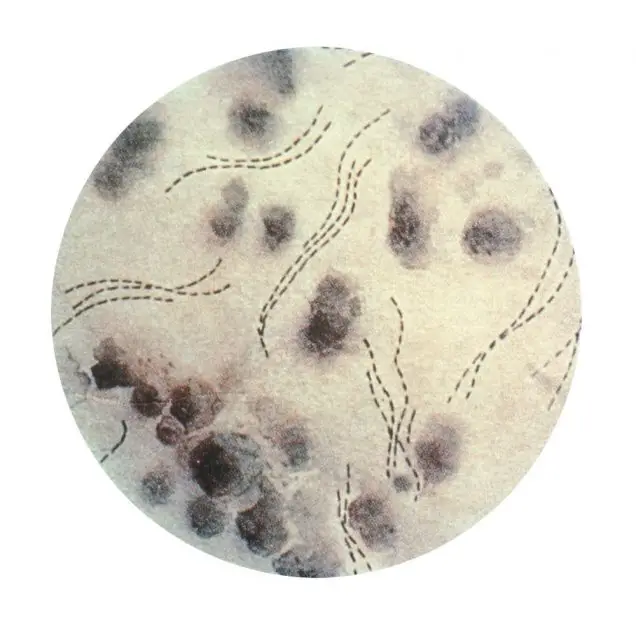
This illustration depicts a photomicrographic view of Haemophilus ducreyi bacteria stained using gentian violet
Incubation Period of Chancroid
12 hours to 5 days.
How is Chancroid contracted?
You can get chancroid sores or spread them through skin-to-skin contact with open sores, from hands that have touched a sore, or from sex toys such as vibrators or dildos that have touched a sore. At the same time you can get the disease after touching someone’s skin with a sore. It is one of the ways when Chancroid may be caught even without sexual activity through contact with infected fluid of another ulcer.
Symptoms of Chancroid
Painful open sores on the genitals and, in some cases, swollen and tender lymph nodes in the groin. Women may be less likely to get the sores; instead, their symptoms may include painful urination or defecation, painful intercourse, rectal bleeding, or vaginal discharge.
Though in some cases Chancroid symptoms can vary depending on conditions and factors, most common side effects of this infection are the same for both men and women. Let’s have a detailed look at all of them.
Men’s symptoms are rather common. Small red bumps may appear around genitals. At first they may not even be noticed by the patient. However it can transform into open sores within few days. Pay attention that ulcers can spread around the area near genitals, on penis and scrotum.
Women who are infected with Chancroid may discover several red bumps at the same time. They can be located between anus and labia, on labia and on thighs. Labia cover women’s genitals. If you start feeling pain during urination it means that bumps are open. It can result in additional irritation and other inconveniences including bowel moving.
At the same time several additional symptoms for both men and women may occur. They are:
- change of ulcer size;
- ulcer center becomes softer and turns grey or yellow;
- ulcer bleeds when touching;
- pain while having sex.
In addition some swelling can also occur when infected by Chancroid.
Infection can lead to large abscesses caused by swollen lymph nodes. This happens when they break through the skin. According to the latest statistics such consequences appear in 50% lymph node swelling cases.
Chancroid Testing
The one and only way to proceed with correct Chancroid diagnoses is to turn to a doctor for additional tests and examinations. He will take samples of fluid from a sore. It will be examined in laboratory. Several other tests may be required in order to confirm diagnoses. At the same time blood tests will help to identify Chancroid. Groin lymph nodes may also be examined by a doctor in case you have pains in that area.
It is also recommended to take additional medical tests which make it easy to determine other possible sexually transmitted infections.
Chancroid lesions can look like syphilis or genital herpes, so a doctor needs to analyze the discharge from the sores to get an accurate diagnosis.
Treatment of Chancroid
There are several basic ways to treat Chancroid. They may vary depending on the level of infection severity. The first stage of disease can be easily treated with the help of medication. At the same time there are occasions when infection goes away on its own. However you should note that it may not happen earlier than in several months which may be inappropriate considering possible side effects. If you want to make your treatment fast and efficient, you should take antibiotic medications. Follow prescriptions of your doctor.
Antibiotics are usually prescribed to terminate bacteria which resulted in infection. In addition they may also come in handy when it comes to decreasing of scarring possibility during ulcer treatment course.
In some cases surgery may be the only way to remove infection. Though it still can result in slight scarring, it will help to prevent swelling and reduce the pain while healing sores.
Antibiotics are usually effective – Zithromax 1.0 gm (250mg x 4 tablets) or Cipro 500 mg twice a day for 3 days or Cipro XR 500 mg once a day for 3 days.
If you are not treated
The sores remaining from an untreated chancroid infection may put you at risk of other STDs, as well as other types of infections.
The best way to avoid any problems in future is to follow prescribed treatment course and take medication according to instructions of your healthcare provider. Though it is believed that chancroid may go away without any healing the cure is till necessary in order to avoid scarring and other unpleasant consequences of infection development.
Those who want to avoid this infection will benefit from our easy steps that will help to prevent the disease:
- first of all you need to use condoms while having sex;
- try to reduce the number of sex partners and stick to safe sex;
- do not be involved in high-risk activities which can lead to occurrence of other sexually transmitted infections;
- warn your partner about development of your infection and do not be afraid to ask him or her the same.

